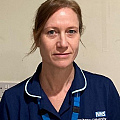Clinical research nursing: A unique opportunity
On international nurses day Sue Stockdale, Senior Clinical Research Nurse at Manchester Clinical Research Facility (CRF) shares why a career in research, though sometimes overlooked, can be incredibly rewarding, and calls out to nurses to ‘consider research.’
I only realise now, after several years working as a clinical research nurse, that I really hadn’t grasped the true extent of its complexity, or the positive impact it could have on patients and the public.
Like many other nurses, during my degree I completed the compulsory ‘Research Methods’ module. However, without the opportunity then to undertake a practical introduction to research, I hadn’t thought about a career in research.
In fact, I only realise now, after several years working as a clinical research nurse, that I really hadn’t grasped the true extent of its complexity, or the positive impact it could have on patients and the public.
Working in a variety of clinical settings, prior to research, enabled me to gain a good level of knowledge and skills in multiple disease areas. After my first 10 years of nursing, I felt confident that I had acquired transferable skills and, though keen to remain in the profession, was interested in exploring alternative avenues.
It was relocating to Manchester that gave me the opportunity to reassess my career and I’ve worked at the NHIR Manchester Clinical Research Facility, at Wythenshawe Hospital, for the last five years. Currently, I’m a senior clinical research nurse.
Why is clinical research nursing so different from other nursing roles?
I will never forget the overwhelming feeling that I had when I started my first role in research five years ago. It was so different to any nursing role I had previously known. Clinical trials can set some particular challenges. For example, timings are absolutely crucial; patient assessments must take place at set times that cannot be deviated from, because doing so could create a lot of paperwork at best or, at worst even jeopardize a trial. Planning, proactive thinking, anticipation of potential challenges and risk assessment are a key part of research. Indeed, I believe preparation, organisation, methodical thinking and attention to detail are key attributes of the well-polished clinical research nurse.
Something I soon learned to appreciate was the importance of the research protocol. The protocol is provided by the trial sponsor and describes the background, rationale, objectives, design, methodology, statistical considerations and organisation of the research project.
Before a study opens, there’s often the opportunity for clinical research nurses to attend an investigator meeting. This meeting usually takes place in the early stages of study set-up and brings together investigators (lead researchers) from other parts of the UK, or even the world. In fact, one of my first investigator meetings took place in Poland. These meetings provide the opportunity to deliver information to study sites and identify and resolve potential challenges. This can also be an important opportunity to network with other clinical research nurses and share best practice.
The challenges and rewards
Of course, challenges exist in any role. As a clinical research nurse, it can be emotionally difficult if you struggle to recruit patients to clinical trials because of strict inclusion and exclusion criteria. The need to care for and improve the lives of others is inbuilt in nurses. For some patients, enrolment onto a trial that’s exploring a new drug, can give them some hope, when all other options have failed. So, it’s particularly distressing for me when this last hope for a patient is crushed, because they don’t fit the criteria for a study.
But, when you do get to work with patients on a clinical trial, it can feel so rewarding. It’s great to witness first hand not only the physical benefits of a new clinical trial treatment, but also the positive, psychological benefits for patients of being in control of their condition. Furthermore, patients often benefit from becoming more informed about their condition, and regular contact with a specialist in their field can provide a higher level of support.
A varied and interesting career
There are plenty of opportunities for development in a clinical research role. I joined the Manchester CRF as a Band 5 nurse and progressed to a Band 6, taking a lead on studies. As a Band 7 senior clinical research nurse, I now oversee the team and guide research leads. I am able to keep my patient contact and clinical skills up-to-date and have even had opportunities to expand my skills to include spirometry testing on the unit. In addition, I facilitate staff training and have been involved in the unit’s quality processes.
I really believe in the importance of the work we do at Manchester CRF, and particularly enjoy promoting the value of our research, whether through working with communications colleagues, or by attending research conferences to showcase the great work that we do.
I am also keen to promote research as a career to the younger generation. So I deliver talks to school groups and I’m currently working with the other Manchester CRF sites (there are four sites across Greater Manchester that form Manchester CRF) to deliver a joint work experience programme. From my own experience I realise how vital this experience could be to attracting future nurses to research.
Clinical research nursing is a very positive, diverse and rewarding career option. No area of nursing practice is static but for those that like to be challenged, enjoy innovation and seek amazing results that literally could change the future of patient care and patients’ quality of life, then consider taking a step into research!





